Is there any point in keeping an appointed Senate in Canada today?
Jun 9th, 2013 | By Randall White | Category: In BriefDr. Dave Town from Orillia, Ontario offered an intriguing comment on my recent post about Senate reform, “Is doing anything sensible with the Senate of Canada just a vain fantasy?” (And I believe he is the same person I have now intriguingly discovered on the “gossip-stew of the internet” : successful chiropractor by day, public-spirited local activist after hours, medal-winning swimmer, close reader of Canadian history, and published local historian.)
Dr. Town complained that my post, while “thorough and thought provoking …didn’t address my biggest question about senate reform –Â the reasons people say we need senate reform in the first place … I can see the need to tweak it, mostly to tighten up spending oversights and slightly re-distribute the seating arrangement due to growth in the west over 100 years, but abolish? Radically re-align? Elect? I just don’t see the need. Maybe you need a post on that topic.”
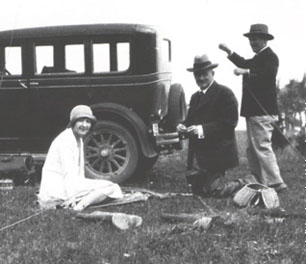
Stephen Leacock (centre) during a fly fishing excursion with May "Fitz" Shaw and Francis Page Hett, Orillia, Ontario, 1933. (Photo by Olive Hett Seale 1933).
In my own fresh Canadian Senate reforming spirit of trying to pay more attention to what others are saying, I am taking up Dr. Town’s challenge, as best I can. And his position on the issue, I think it’s worth stressing, isn’t just something that he is thinking about all by himself in Orillia, Ontario (also btw an old haunt of the humourist and political scientist, Stephen Leacock, 1869—1944 – a fresh biography of whom, by Margaret Macmillan, appeared just a few years back).
As Aaron Wherry urged on the Maclean’s website several days ago: “If you believe that there needs to be a second chamber (I don’t) or that the odds of abolishing the Senate are too long (I refuse to give in to such defeatism), there is a case to be made that an appointed and thus less-legitimate Senate is preferable to an elected and thus democratically empowered Senate. I’m not convinced by any of the arguments for maintaining a Senate, but if you insist on having one, you’ve actually got to decide what sort of Parliament you want. And those who favour an elected Senate have some important questions to answer in terms of how they imagine the House and the Senate will interact …Â Â You now at least have three options to choose from. Stephen Harper wants an elected Senate. Justin Trudeau wants an appointed Senate, but wants to change the way senators are appointed. And Thomas Mulcair wants to abolish the Senate.”(Italics added.)
I also want to urge myself, right up front, that, as polling analyst Éric Grenier has recently pointed out: “Opinions about what should be done with the Senate have shifted back and forth for decades, but polls suggest Canadians are becoming less and less accepting of the current process for nominating [ie appointing] senators. Support for abolishing the Senate is creeping upwards, and the recent scandals seem unlikely to reverse the trend … Electing senators is the overwhelming choice for the kind of reform that should take place, and support for it has grown. Angus-Reid has found that support for ‘allowing Canadians to directly elect their senators’ has gone from 60 or 63 per cent in 2008 to around 70 per cent in the last few years.”
At the same time again, the “tweak-appointed” position Dave Town is pointing to, as it were, does seem to me similar enough to the Senate reform position apparently advocated by Justin Trudeau, new leader of the Liberal Party of Canada. And if I were Stephen Harper – whose current parliamentary majority in Ottawa depends quite a lot on the same Ontario-beyond-Toronto regions frequented by Dr.Town – I’d be starting to wonder, a little at least, about just what is going on in the Ontario countryside (and other such places elsewhere, across the land).
AND NOW, ONCE AGAIN, HERE IS FOR FAR MORE THAN ANYONE EVER WANTED TO KNOW ABOUT THE REASONS PEOPLE SAY WE NEED SENATE REFORM IN THE FIRST PLACE … (and/or just quickly scroll through and/or ignore) …
1. Democracy means never having to say you’re sorry, etc, etc …
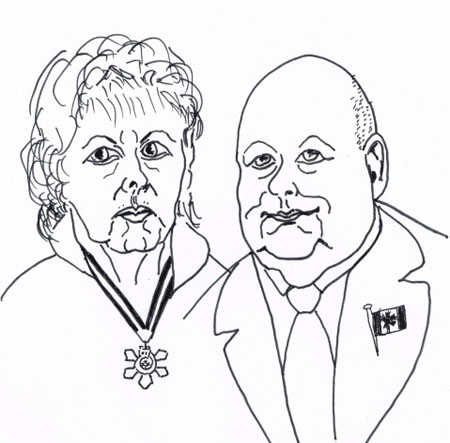
Senators and Order of Canada recipients Pamela Wallin and Mike Duffy resign from Conservative caucus over Senate expense-claim scandal. Ian Hamilton’s Daily Drawings.
The first thing to say about “the reasons people say we need senate reform in the first place,” it seems to me, is that reasons of this sort in political debates are ultimately just opinions. You or I may have good or bad reasons for our political opinions, but in the end they are just opinions all the same. And the principle that we are all entitled to our own political opinions is a crucial hallmark of any working real-world democracy.
Similarly, far too many years of arguing about political opinions has convinced me that the process of trying to change such things is not exactly rational. I can tell you what I think my reasons for my opinions are. But my experience has most often been that this is not all that likely to change your opinions. (Just as I am not all that likely to change my opinions if you tell me your reasons for your different opinions.)
I happen to believe that the present unreformed Senate of Canada stands in need of quite major change. And I have believed this for many years – long before the recent Duffy-Wallin-etc Senate expense scandals (which, I agree, are not all that appalling in any broader scheme of utterly outrageous and appalling political scandals).
To me the question of the present unreformed Senate of Canada today is similar to the question of the British monarchy in Canada today. Both, I feel, are relics of the 19th century colonial era in our history – and are no longer relevant or appropriate in what our Constitution Act, 1982 alludes to as the “free and democratic society” we enjoy in the Canada of the 21st century.
The crux of my feelings here – or my reasons for saying we need senate reform in the first place – is democracy. The Canadian confederation of 1867 was the first self-governing dominion of the British empire, and not exactly a democracy (as various historians I have read have underlined). But Canada has evolved over the subsequent 146 years. We are no longer a mere dominion of the British empire (which has itself been transformed into the modern Commonwealth of Nations). And we have very much become an independent sovereign (parliamentary) democracy in our own right.
The general argument, I think, has been nicely enough summarized on the University of Calgary Faculty of Law Blog : “The present Conservative government criticizes the Senate as being an antiquated and undemocratic institution … Prime Minister Stephen Harper has gone so far as to require all of his Senate nominees to pledge support for his Senate reform agenda …When the [current] Senate Reform Act was introduced in June 2011 Tim Uppal, the Minister of State for Democratic Reform, said that the purpose of the Act is to make the Senate ‘more democratic, accountable, and representative of Canadians’ …Â Ultimately, reforming the Senate is about resolving its democratic deficit.”
I do not support many or even any other Harper government policies. But I do support this one. (Even if I am not always or lately ever sure that Stephen Harper himself does!) To me, no merely appointed Senate – no matter how impressively the appointments are made, or by whom – can be a seriously credible and legitimate legislative body in the kind of free and democratic society we enjoy in Canada today.

Democratic refugees from Hitler’s Germany in America : Left to right – Franz and Inge Neumann, Golde and Leo Löwenthal, and Herbert and Sophie Marcuse, ca. 1937.
I can also appreciate that other Canadians still do believe some kind of appointed Senate can even serve some kind of democratic purposes in Canada today. But I do not see this myself.
As already noted, there is, I think, ultimately no strictly reasoned way of resolving this kind of conflict. Philosophically, I like the position taken by the political and legal theorist Franz Neumann, in his late 1950s essay collection on The Democratic and the Authoritarian State: “What [John Stuart] Mill… says so impressively is … that the truth can arise only from the competition of opinions … that it can thus never be a matter of tolerating other views, but that the truth is discoverable only through the clash of different opinions.”
Practically, we finally resolve clashing opinions in a democracy (or we at least ought to) by letting the majority of the active citizenry decide. And in principle I like Senator Hugh Segal’s proposal for a referendum on the fate of the unreformed Senate of Canada.
2. In between the lines of “Is doing anything sensible with the Senate of Canada just a vain fantasy?”
I do think it is broadly correct that my earlier post about Senate reform in the true north, “Is doing anything sensible with the Senate of Canada just a vain fantasy?,” tended to assume rather than explain the case for major Senate reform (and/or abolition) in Canada today.
But I also think that various ingredients of this case did appear in between or otherwise around the lines. And it may help flesh out my attempt here to explain the reasons people say we need senate reform in the first place to quickly review these arguments between the lines :
* I noted myself : “As matters stand, The Unreformed Senate of Canada (itself the title of a book first published in the 1920s) is still what alleged Senate reformer Stephen Harper nicely called it in a Vancouver speech more than seven years ago : ‘a relic of the 19th century.’ It desperately needs to be brought into the present (or, others would say, just abolished altogether).”
* I similarly alluded to a parallel passage from Jesse Kline’s National Post article : “Real Senate reform … would turn an anachronism into an asset for Canada.”
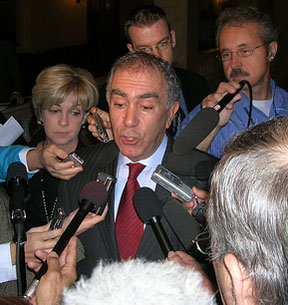
Ontario Liberal luminary Gregory Sorbara, talking to the press as provincial Minister of Finance, 2007.
* I alluded to Gregory Sorbara’s “formula for an independent, non-partisan Senate,” appointed by “a 20-member Senate Appointments Committee (SAC) made up of respected members of the Order of Canada.” And I then commented : “this kind of Senate reform proposal strikes me as essentially anti-democratic. It just perpetuates the elitist, quasi-aristocratic style of the original 1867 Senate of Canada, which was far too inspired by the British House of Lords. I think there is a growing consensus among the people of Canada today that if the Senate is not going to be democratically elected, it ought to be abolished.”
* I wrote: “The original 1867 Senate of Canada, it might be said, had two major purposes. The first was to serve as a kind of quasi-aristocratic chamber of ‘sober second thought’ : a check, as it were, on the more hasty democratic impulses of the popularly elected Canadian House of Commons – more or less after the fashion of the House of Lords in the old Mother Country. The second was ‘regional representation’ beyond mere population numbers, in a geographically vast federation – more or less on the model of the adjacent United States Senate.” What I might have added here (but didn’t) is that, in my view, the first of these original purposes is no longer relevant in what the Constitution Act, 1982 calls the “free and democratic society” we enjoy in Canada today. To me effective regional representation in a geographically vast federation of diverse provinces is the main purpose of a Canadian Senate in the 21st century. (And for an up-to-date second purpose see the last item in this section below, on a recent Saskatoon Star Phoenix Senate reform editorial.)
* I quoted a recent apt complaint from an editorial in the Hants Journal in Nova Scotia : “Currently, new Senate members are appointed by whoever is in power. This time, it’s the Conservatives, and they’ve stacked the Senate with party faithful.”
* I quoted what strikes me as an especially apt passage from the Saskatoon Star Phoenix’s May 22, 2013 Senate reform editorial : “Mr. Harper has also demonstrated why Canada needs an effective and democratic check on executive power … In a report issued this month by the Washington-based Transatlantic Academy, entitled Democracy in Trouble, political scientists David Cameron and Robert Vipond compare how two of the world’s oldest and most successful democracies –Â Canada and the United States –Â have stumbled into difficulty. In the case of America it’s because of partisan-orchestrated stagnation, while in Canada it is the effect on the electorate of the ‘friendly dictatorship’ with all the power emanating from the PMO.” And I should add myself that I do not think any kind of merely appointed Senate could act as a credible and effective check on the overweening power of the friendly PMO dictatorship (any more than the present appointed Senate can seriously perform this kind of important function).
3. Harold Innis’s case from the 1940s

Harold Innis with the Fourth Battery of the Canadian Expeditionary Force in Western Europe during the First World War, 1916.
At the risk of altogether boring to death any who have made it this far in what yet again seems to be evolving into yet another far too long “miniature long-winded dissertation on why Canadian Senate reform remains crucial, despite all the arguments against it,” I want to allude to some remarks about the unreformed Senate of Canada from the writings of “Canada’s first and perhaps only genuine intellectual,” Harold Adams Innis.
Born on a family farm in Southwestern Ontario in 1894 (and dead in Toronto all too early in 1952), Innis was the godfather of Alberta-born Marshall McLuhan. He was also the first Canadian born chairman of the Department of Political Economy at the University of Toronto (1937—1952), the first Canadian President of the American Economic Association, and the author of what still strikes me as the single most interesting (and important) book on Canadian history (The Fur Trade in Canada : An Introduction to Canadian Economic History, first published in1930 and still in print).
Whatever else might be said about him (and he has more than a few critics), Harold Innis, I think, has probed the depths of the Canadian experience deeper than anyone else, before or since. Along the way, he had a few things to say about what he called “that unique institution,” the Senate of Canada. Without wanting to get into any great detail on the subject right now, I think his more or less random observations on the Senate, and the related issue of Canadian regionalism, add up to a quite sophisticated case for major Senate reform.
Here are eight quotations of this sort from Chairman Innis, so to speak. They are taken from two of his later essays from the 1940s, “Great Britain, the United States and Canada” and “Decentralization and Democracy.” These essays were re-published in Essays in Canadian Economic History (edited by Mary Q. Innis, 1956), and, more recently, Staples, Markets, and Cultural Change (edited by Daniel Drache, 1995) :
* “Our constitution has proved inadequate in the face of the demands made upon it. The Senate, that unique institution, has lent itself to political manipulation …Â Politicians have before them as their reward for activity an appointment to the Senate for life …” [My note: This was changed to retirement at 75 in 1965, or as the Harper government explains:“Senators were originally appointed to the Senate ‘for Life’, but that was changed unilaterally by Parliament through an amendment to section 29 of the Constitution Act, 1867 … that created the current mandatory retirement provision for senators attaining the age of 75 years.”]
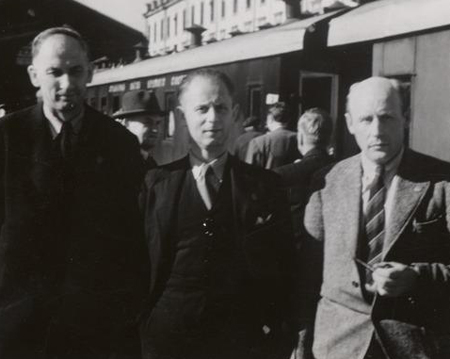
Harold Innis (l), Hans Seyle (c), and Alf Erling Porsild (r) on a visit to the Soviet Union, just after the end of the Second World War in 1945.
* “The Senate … provides … a support to party organizations throughout Canada. A federal party organizer can be appointed to the Senate and the cost for secretarial services charged to services to the country…”
* “A senatorship is also a reward for journalists who have been active in the party’s interest and who will presumably continue active after their appointment …”
* “A senator stands as a guard over the party’s interest and is expected to be continually alert to the improvement of the party’s position in the region from which he is appointed. The entrenched position of the party in the Senate contributes to inflexible government, makes political instruments less sensitive to economic demands, and possibly contributes to the rise of new provincial parties …”
* “Provincialism has paralleled the new industrialism … Confederation as an instrument of steam power has been compelled to face the implications of hydro-electric power and petroleum …Â Strains on the political structure have been evident on all sides as problems of adjustment have become more acute …”
 * “The Senate … was created in a period with limited political capacity and little effort has been made to adjust its membership to the increase in talent available. Necessities of party organization have made it a pasture for old party war horses …Â With limitations of the Senate the strain on the courts has not been lessened …”
* “The Senate … was created in a period with limited political capacity and little effort has been made to adjust its membership to the increase in talent available. Necessities of party organization have made it a pasture for old party war horses …Â With limitations of the Senate the strain on the courts has not been lessened …”
* “The complex problems of regionalization in the recent development of Canada render the political structure obsolete and necessitate concentration on the problem of machinery by which interests can become more vocal and their demands be met more efficiently … serious attention should be given to the problem of revising political machinery so that democracy can work out solutions to modern problems …”
* “The dangers of an obsolescent political structure cannot be avoided by patchwork solutions … Each region has its conditions of equilibrium in relation to the rest of Canada and to the rest of the world …”
4. Last thoughts
I have a few final thoughts – and/or final quotations :
(1) A passion for democracy, as noted earlier, lies at the crux of my own belief that the present unreformed Senate of Canada stands in need of quite major change. Yet I also agree that it is important not to romanticize or be naive about such passions.
One of the most sensible things I have read lately on this front comes from the late great poet of the American West, Ed Dorn: “I take democracy very seriously, but on the other hand, it’s a form of government that you have to change your mind about a lot because its form is protean, and its instinct, essentially, comes from a mob psychology. Unlike an adherent to a dogmatic position like Marxism, about which there is very little to change your mind, a democrat is liable to change his mind a lot. So none of these concerns and principles ever leave my mind much, but I vary my attitude according to the angles of perspective I’m able to get on them. Democracy literally has to be cracked on the head all the time to keep it in good condition. But all other forms are more or less sudden death.”
Or, if you like, I think the kind of at least more or less major reform I tried to point to in “Is doing anything sensible with the Senate of Canada just a vain fantasy?” would do Canada a lot of good. But nothing in the real world of politics is even close to perfect. (Or, as Bland Bill Davis once said about the home province of both myself and Dave Town : “The people of Ontario have never been spoiled by too much perfection in government.”)

Prime Minister Stephen Harper speaks to his caucus on Parliament Hill in the midst of growing scandal over senators' expenses and the abrupt departure of his chief of staff. He told party members he's "unhappy" with the situation. Later in the day he flew to South America.THE CANADIAN PRESS/Fred Chartrand.
Almost a quarter of a century after my book on the subject, I remain somewhat sceptical at best about the realistic prospects for even some modest brand of Senate reform in Canada. I refuse to give up hope altogether, but …
(2) I have been impressed by another recent Senate reform article in the Saskatoon Star Phoneix, this time by John D. Whyte, “a policy fellow at the Johnson-Shoyama Graduate School at the University of Regina.” It makes a number of apt concluding points for my purposes here : “A well-functioning second chamber represents an essential constitutional structure for Canada. Nevertheless, an unelected Senate is an anomaly in a modern democratic nation, and reform is necessary …Â Some raise an alarm over the idea of an elected Senate on the ground that it would gain too much political legitimacy and frustrate the capacity of the Commons to enact laws. This overstates the risk … First, the Senate’s moral compass and, hence, its boundary of legitimacy, will be to check excesses in the government’s legislative agenda, not take over the legislative program …Â Second, if senators are elected, it is difficult to see their democratic deficit in making legislative decisions. Third, other countries’ constitutions … stipulate mechanisms for overriding upper chamber decisions in significant instances.”
Aaron Wherry, that is to say, recently urged on the Maclean’s website :“I’m not convinced by any of the arguments for maintaining a Senate, but if you insist on having one, you’ve actually got to decide what sort of Parliament you want. And those who favour an elected Senate have some important questions to answer in terms of how they imagine the House and the Senate will interact.” I think, however, that he’s just showing he hasn’t done quite enough research yet.

NDP leader Tom Mulcair speaks with the media in the Foyer of the Senate following caucus meetings on Parliament Hill Wednesday May 22, 2013 in Ottawa. (Adrian Wyld/THE CANADIAN PRESS).
The example of the US Senate and House of Representatives next door, I agree, is a bit troubling. But it is finally not relevant for us in Canada, because we have a rather different British-style or “Westminister” parliamentary form of democracy. The elected Senate that our fellow former British dominion and continuing parliamentary democracy in Australia has lived with quite successfully for some 112 years is the example we should be concentrating on.
As I argued in my earlier post : “Canada’s fellow parliamentary democracy of Australia already has a procedure for dealing with intermittent conflict between its ‘upper’ Senate and its ‘lower’ House of Representatives. And Canada may want to take some useful instruction from that source.” The Senate reform proposal in our own 1992 Charlottetown Accord also addressed the problem Aaron Wherry is so worried about. And Canadian Senate reformers of the 21st century might want to have a second look at that as well.
* * * *

Monument of Samuel de Champlain in Couchiching Beach Park Park, Orillia, Ontario. Image courtesy of Ken Jarvis Photography.
Two very final quick thoughts … First, as far as I’m concerned, there is no point at all in carrying on with any kind of merely appointed Senate of Canada today. I agree with those who feel that if we cannot find the resources within ourselves to create an effective, elected Senate that more adequately represents our current regional geography, then we should just abolish the thing. (And if that really is impossible, then we should just stop talking about the “Red Chamber” in Ottawa altogether, and stop giving it more money than it needs to survive on an austere diet of day-old bread and tap water.)
As an absolutely very final thought, no matter how many vain words I and others try to throw at the subject, Chantal Hébert at the Toronto Star is probably right when she urges that “Even Senate scandal will fade before next election … Two years from now, there will likely be little or no external trace of the beating the federal government is enduring now …” As the summer barbecue season of 2013 comes into view, we are probably a little closer to the kind of elected, effective, and regionally representative (EERR?) Senate of Canada I would like to see myself. But we still have many, many, many kilometres to go before we rest.
Randall White, a former Ontario public servant who now works as an independent public policy consultant, is the author of a number of books on Canadian history and politics, including Voice of Region : The Long Journey to Senate Reform in Canada.

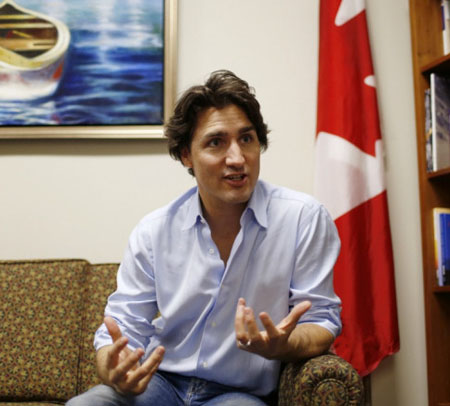
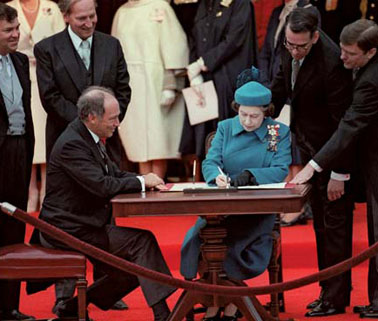
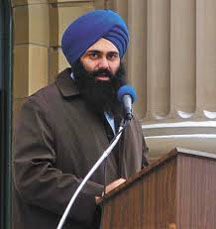






Thanks for your again thorough response to my comment. A lot to digest there. Not being a blogger I guess this is 15 minutes of fame for me. If you are interested in my position re the senate read my letter to the editor in our local paper:
http://www.orilliapacket.com/2013/05/30/calls-to-abolish-senate-misguided
Sirs –
Photo shows ‘Alf Erling Porsild’ in Moscow; not ‘Alf Earling Porsild’ …….
Per Porsild
Hamar
Norway